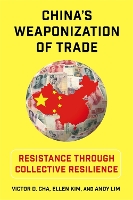


|
|
|
books
| book details |
China's Weaponization of Trade: Resistance Through Collective Resilience
By (author) Victor Cha, By (author) Ellen Kim, By (author) Andy Lim

|
This book is currently unavailable. Enquire to check if we can source a used copy
|
| book description |
In recent years, China and the United States have each turned economic interdependence into an instrument of coercion, using their dominant positions in international trade to push states and firms to comply with their political goals. What is distinctive about this form of economic pressure, and how can other countries fight back? This groundbreaking book explores the weaponization of economic interdependence and its implications for the international order through a wealth of new and original data on China’s economic statecraft. Victor D. Cha, Ellen Kim, and Andy Lim examine how and in what ways the United States and China have deployed economic coercion, focusing on China’s extensive use of this tactic over the past three decades. They analyze a vast data set that includes more than 600 cases of China’s economic bullying of states, companies, and individuals in North America, Asia, and Europe. Cha, Kim, and Lim propose a multilateral strategy of “collective resilience†to counter intimidation, showing how targeted states can band together, leverage trading relationships, and threaten retaliation. Synthesizing new insights from unique trade data with international security expertise, this timely book sheds new light on how China exercises economic power—and it provides a playbook to deter bullies and rebalance the global order.
| product details |
Normally shipped |
Publisher | Columbia University Press
Published date | 6 Jan 2026
Language |
Format | Paperback / softback
Pages | 416
Dimensions | 235 x 156 x 0mm (L x W x H)
Weight | 0g
ISBN | 978-0-2312-2240-2
Readership Age |
BISAC |
| other options |
|
|
|
To view the items in your trolley please sign in.
| sign in |
|
|
|
| specials |
|
|
Let's stare the future down and, instead of fearing AI, become solutionists.
|
|
This first comprehensive biography of Cecil Rhodes in a generation illuminates Rhodes’s vision for the expansion of imperialism in southern Africa, connecting politics and industry to internal development, and examines how this fueled a lasting, white-dominated colonial society.
|
|
|
|